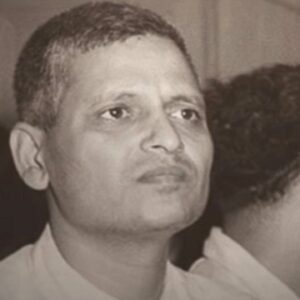On January 30, 1948, in New Delhi, an ardent Hindu nationalist named Nathuram Godse shot Mahatma Gandhi three times in the chest from point-blank range. Godse, who formerly held Gandhi in high regard, accused him of backing Muslim political aspirations in India during the country’s division. He opposed Gandhi’s proposal for Hindustani, a language that combines Hindi and Urdu, as India’s national tongue. He and Narayan Apte, along with six other people, planned the killing because he was so persuaded that Gandhi’s principles were harming the interests of millions of Hindus. Despite Gandhi’s two sons’ attempts at commutation, Godse was executed by hanging in the Ambala Central Jail on November 15, 1949, following a protracted trial.
Early Childhood & Life
Nathuram Godse was born on May 19, 1910, as Ramachandra Vinayak Godse in Baramati, Pune district, Bombay Presidency, British Raj, today in Maharashtra, India. His parents were devout Brahmins. He was the fifth child born to Vinayak Vamanrao Godse and Lakshmi, both postal workers.
Prior to enrolling at an English-language school in Pune, where he was then sent to reside with an aunt, he first attended the neighborhood school in Baramati. On the other hand, he failed his matriculation exam and left school.
Electoral Life of Nathuram Godse
After his family relocated to Ratnagiri in 1929, Nathuram Godse—a fervent supporter of Mahatma Gandhi while still in school—became influenced by the Hindu nationalist and independence activist Vinayak Damodar Savarkar.
He joined the Savarkar-led Hindu Mahasabha, an extreme Hindu nationalist organization, and later joined the Rashtriya Swayamsevak Sangh in Sangli in 1932 as a “boudhik karyawah” (ground worker).
He founded and co-led the Marathi-language periodical “Agrani” for the Hindu Mahasabha. He co-translated Babarao Savarkar’s novel “Rashtra Mimansa” into English with M. S. Golwalkar, but the two fell out after Golwalkar claimed credit for the translation.
On Vijayadashami day in 1942, he established his own group, the “Hindu Rashtra Dal,” but he continued to be a part of the Hindu Mahasabha and the RSS. He later cut ties with the RSS because he believed it was softening its opposition to the establishment of Pakistan, a distinct nation-state with a mostly Muslim population.
He had originally backed Gandhi in his efforts to abolish the caste system and untouchability, but he now believed Gandhi’s nonviolent approach was futile and accused him of appeasing Muslims, which he claimed was the cause of the division.
He believed that Gandhi’s beliefs delayed the country’s prosperity after independence when Gandhi vowed to go on a hunger strike if the government stopped payment to Pakistan due to aggression on Kashmir.
Gandhi’s assassination and trial
On January 30, 1948, while Mahatma Gandhi was passing through the Birla House in New Delhi with his two grandnieces, Manuben and Abha, Nathuram Godse approached him and bowed in front of him. He pulled Manuben aside and shot Gandhi in the chest three times at point-blank range with a Beretta M1934 semi-automatic pistol after being informed that Gandhi was already running late for the evening prayers.
Gandhi passed away a short while later in his chamber at Birla House, and according to various accounts, Godse either surrendered or was physically assaulted by the crowd before being rescued by the police. He was put on trial at the Punjab High Court in Peterhoff, Shimla, after confessing to his crimes.
On November 8, 1949, the court gave him the death penalty; as a result, Gandhi’s two sons, Manilal and Ramdas, pleaded for a commutation because it went against their father’s principles. Godse was hung in Ambala Jail on November 15, 1949, as a result of the refusal of Indian Prime Minister Jawaharlal Nehru, Deputy Prime Minister Vallabhbhai Patel, and Governor-General Chakravarti Rajagopalachari to accept the petition.
Aftermath of Nathuram Godse
The Hindu Mahasabha and the RSS were accused of funding the conspiracy after Nathuram Godse assassinated Mahatma Gandhi, and Brahmins in Maharashtra became the targets of vengeance. A temporary ban on the RSS was also imposed; it was finally lifted in 1949 after it became clear that there was no connection between the RSS and Godse, whom the RSS said had left the group in the middle of the 1930s.
In plays, books, and documentary film over the years, there have been various attempts to celebrate Godse’s deeds by depicting him as a patriot, but the majority of these have been banned.
Facts of Nathuram Godse
Nathuram Godse, whose three older brothers had all passed away in infancy, was initially reared by his family as a girl in order to break the “curse” until the birth of his younger brother. His nose was pierced with rings, or “nath,” in accordance with conventional feminine fashion, earning him the moniker “Nathuram.”
Estimated net worth
The estimated net worth of Nathuram Godse is about $1 million.


